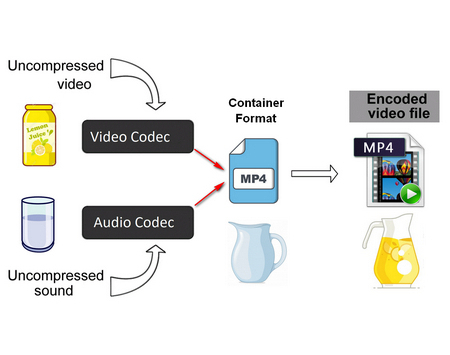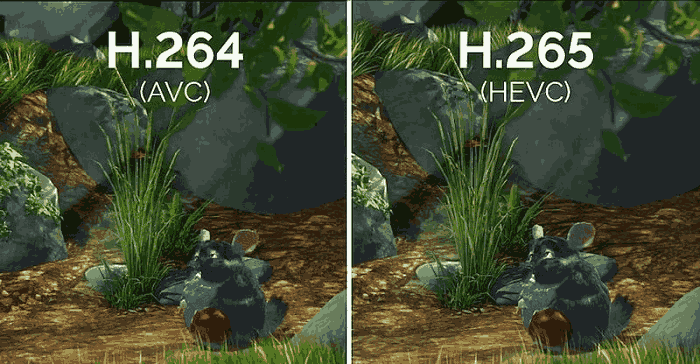H.264 and H.265 video compression standards have been instrumental in shaping the digital landscape. Despite serving the same basic purpose of compressing and decompressing video data, these codecs have respective strengths that make them suitable for specific applications.
In this blog, we’ll delve into the details, compare these two codecs, and hopefully guide you toward the one that best suits your needs.
Compression Efficiency

These codecs’ heart lies in their ability to compress video data efficiently. What is HEVC? H.265, also known as High-Efficiency Video Coding (HEVC), leaps forward. It boasts enhanced compression algorithms, resulting in significantly smaller file sizes than its predecessor, H.264. This breakthrough enables smoother streaming, quicker downloads, and optimized storage.
Video Quality
While compression is essential for efficient data transmission, it inevitably challenges video quality. H.264 strikes a balance, delivering commendable video quality with moderate compression. H.265 further elevates this equilibrium by maintaining higher video quality at lower bitrates, making it an ideal choice for high-resolution content.
Bitrate and Bandwidth

Codec efficiency is pivotal in determining the required bitrate for streaming or downloading videos. H.265’s superior compression efficiency translates into reduced bitrate demands, ensuring smoother playback even in bandwidth-constrained scenarios.
Device and Platform Compatibility
Before opting for either of these codecs, it’s important to understand their compatibility across devices and platforms. H.264 is widely supported by streaming services such as YouTube and Facebook Live, making it the preferred choice for creating videos targeting a wide range of audiences. Meanwhile, H.265 may not be well-supported across some browsers or mobile devices, limiting its usage.
Encoding and Decoding Complexity

The complexity of encoding and decoding processes influences computational requirements and playback performance. H.264, with its established presence, boasts broad compatibility and efficient processing. H.265, while demanding higher processing power, compensates with unmatched compression prowess.
Streaming and Broadcasting
Regarding streaming and broadcasting, H.264’s well-rounded compatibility makes it a popular choice for low-latency video delivery. However, with its advanced compression capabilities, H.265 can reduce bandwidth consumption in high-quality video delivery applications such as UHD TV or 4K/8K broadcasting.
Should I Use H.264 or H.265? Decision Factors
Several factors come into play when deciding between H.264 and H.265. To sum up, here’s a quick overview of the key points discussed in this blog:
- Compression Efficiency: H.265 leaps forward with its enhanced compression algorithms, resulting in significantly smaller file sizes than H.264.
- Video Quality: H.264 offers commendable video quality with moderate compression, while H.265 maintains higher quality at lower bitrates.
- Bitrate and Bandwidth: H.265’s superior compression efficiency translates into reduced bitrate demands for efficient streaming or downloading of videos.
- Device and Platform Compatibility: H.264 is widely supported by streaming services such as YouTube and Facebook Live, while H.265 may not be well-supported across some browsers or mobile devices.
- Encoding and Decoding Complexity: H.264’s established presence ensures broad compatibility and efficient processing, while H.265 demands higher processing power but compensates with unmatched compression prowess.
- Streaming and Broadcasting: H.264 is a popular choice for low-latency video delivery, while H.265 can reduce bandwidth consumption in high-quality video delivery applications such as UHD TV or 4K/8K broadcasting.
Ultimately, your choice of codec should depend on the requirements of the application you are building and the audiences you are targeting. If compression efficiency is your primary concern, H.265 is the way to go. But if broad compatibility and efficient processing power are essential, H.264 is a better option.
To wrap it up, both codecs have strengths that make them suitable for particular use cases. And with new advancements in video compression technology coming out every day, we can look forward to more powerful solutions down the line.
Making the Final Call: Should You Choose H.264 or H.265?
In conclusion, H.265 boasts superior compression efficiency and higher-quality video than its predecessor, H.264. That said, compatibility issues with certain devices or platforms remain an issue for widespread codec adoption across all streaming services and applications. To make the most informed decision, consider your target audiences and usage scenarios before making the call.
Both codecs will serve you well in streaming and broadcasting applications. But if you want to save on bandwidth while delivering high-quality videos, H.265 is your best bet.
At Z3 Technology, we strive to provide our customers with solutions tailored to their needs. Our team of video professionals are experienced and knowledgeable in the field, so you can be sure that you will get the best advice when choosing between H.264 and H.265. Contact us today for a consultation – our experts are always ready to help!

